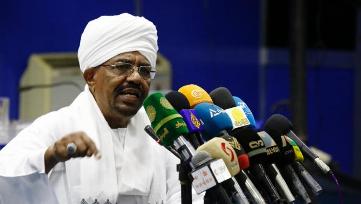Bashir says U.S. sanctions hurting Sudanese economy
November 23, 2015 (KHARTOUM) – The Sudanese President Omer Hassan al-Bashir reiterated on Monday that U.S. sanctions represent a barrier to dealing with international institutions and deprives his country from debt relief and attracting foreign investments as well as obstructing exports and imports alike.

In his remarks before the United Nations Conference on Trade and Development (UNCTAD) and the Africa 17th Conference and Exhibition for oil, gas and minerals, Bashir urged the UN to play a role in removing the disparities between rich and poor nations.
He stressed that Sudan is affected by the unilateral sanctions and the “unjust siege” and called on the world body to help lift them and to facilitate the adoption of a fair global trade system.
Bashir emphasized that the sanctions have contributed to an increase in poverty levels in Sudan.
He noted that Sudan alone had to bear the financial and economic burdens resulting from the north-south peace process without aid from the international community, adding that the secession of South Sudan in 2011 took a heavy toll on his country’s economy.
The Sudanese leader briefed the conference on the government’s efforts to bring peace through national dialogue with the goal of achieving development, security and political stability. He also pointed out to the growing freedoms in Sudan.
He expressed the hope that the UNCTAD conference will help shift positions of all parties, including developed countries to support national efforts to bring about a secure, stable and prosperous future for future generations.
He underscored the need for reforming the international economy and global financial system to help developing countries and support their participation in the decision-making process at international financial institutions.
Bashir warned that the existing disparities between rich and poor nations has become a major factor in the reduction of the United Nations capacity to respond to changes and achieve sustainable development goals.
(ST)
